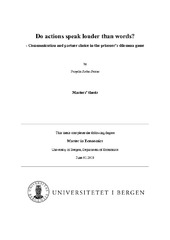| dc.description.abstract | Communication has been shown to enhance cooperation (Dawes, McTavish and Shaklee 1977; Isaac and Walker 1988; Sally 1995; Bochet, Page and Putterman 2006). But do all people benefit equally from communication? This thesis experimentally investigates two main research questions. First, how does chat room communication affect cooperation between two individuals in a social dilemma? Second, are individuals with different cooperative dispositions affected differently by communication? I also explore how potential partners use language to affect each other’s behaviour. I conduct an experiment to answer these questions. The experiment consists of three parts. In the first part, I elicit subjects’ cooperative dispositions. In the second part, I study participants’ cooperative behaviour in a two-person repeated prisoner’s dilemma. All subjects are randomly placed in potential pairs of two. Each subject may choose to form a mutual partnership with the other person before engaging in the prisoner’s dilemma. Half of the pairs may communicate with each other through a chat room prior to the partner choice. In the third and final part of the experiment, I re-elicit subjects’ cooperative dispositions. Results show that communication does not increase the overall probability of successfully forming a mutual partnership or subjects’ overall payoff. However, subjects’ average contributions are higher when they may communicate with their potential partner. More specifically, subjects classified as Cooperators in the first part of the experiment contribute significantly more when able to communicate, compared to Cooperators who cannot. Free Riders who may communicate are more likely to form mutual partnerships and they earn a higher payoff than Free Riders who may not communicate. The experiment is computerized using the experimental program z-Tree 3.6.7 (Fischbacher 2007). Results are analysed using the statistical software STATA/IC 14.2 and Microsoft Excel 16.12. | en_US |
